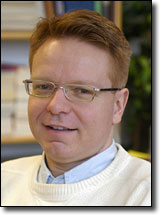

Mats Viberg, Chalmers University of Technology
Björn Ottersten, Royal Institute of Technology (KTH), Sweden
Engine designers are facing increased challenges due to demands for improved efficiency and reduced emission levels. Legislations and costumers environmental awareness work together to drive research and development. In a modern car, "Electronics" represents approximately 1/3 of the value, and the figure is steadily increasing. A great part of this will be due to active safety systems, using e.g. radar and visual sensing. The objective of this talk is to show how signal processing can be used to address critical issues in the diagnosis of combustion engines. Together with novel control strategies, this is an enabling technology for future combustion processes with significantly reduced emissions and higher efficiency. We believe that the signal processing community should play an active role in research and development in this area, which is traditionally populated by the mechanical engineering and control societies.
With the perhaps sole exception of air-fuel ratio control (via the lambda-sond), today's engines are essentially operating in open loop. The various actuators, such as injection and valve timing, spark timing etc., are chosen according to a look-up table. For every driving condition (e.g. engine speed and load), the optimal control is determined by a time-consuming experimental procedure. This is called engine calibration. In modern engines, the number of vaiables to calibrate approaches 10, implying that the cost for engine calibration becomes unacceptably high. Add to this the fact that components age, so that the control quickly becomes suboptimal. An alternative, or at least a complement, to a calibration table is closed-loop control. This requires that a suitable measure of engine performance can be defined, and estimated using some sensor measurement. In fact, it is generally believed that advanced engine concepts, such as Homogeneous Charge Compression Ignition (HCCI), cannot be realized without closed-loop control.
A number of sensors have been proposed to gain information regarding the combustion process. The most direct approach is a pressure sensor in each cylinder. Unfortunately, in-cylinder pressure measurement remains unreliable and expensive, mostly due to the hostile environment. Instead, other sensors must be used to estimate the sought information. The situation is indeed at the heart of signal processing: use clever signal processing to measure the unmeasurable! Among the available sensors, we mention crank-angle rotation, structure borne sound, ion current and crank-angle resolved torque. Various forms of in-direct pressure sensors have also been proposed. A survey of sensors will be given, with respect to their potential for engine diagnosis. Examples of combustion information of interest include misfire (a cylinder did not burn), combustion phasing and knocking. The latter refers to a spontaneous ignition, which can seriously damage the engine.
We will also present a strategy for closed-loop control of combustion phasing. This is central to engine efficiency; the energy from the combustion must be released when the lever is optimally placed, so that maximum torque is delivered to the crankshaft. Results from real-time control of a Volvo V70 engine will be presented. The engine is equipped with a torque sensor, mounted at the crankshaft near the flywheel. The phasing measure is based on a new concept, termed torque ratio. To determine the individual contributions of the various cylinders to the torque ratio is a challenging signal separation as well as inverse filtering problem. This is due to torsional vibrations, which makes the individual contributions overlap significantly in time. We will also discuss other diagnostic information of interest, including reconstructing the entire pressure signal in each cylinder. Finally, the possibilities to predict emissions, so called "virtual sensing" will be discussed.
 Mats Viberg received the PhD degree in Automatic Control from Linköping
University, Sweden in 1989. During 1989-1992 he was an Assistant Professor in
Linköping University and 1992-1993 he held visiting Scholarships at the
Information Systems Laboratory, Stanford University, and the Department of ECE,
Brigham Young University, USA. Dr. Viberg was appointed full professor at
Chalmers University of Technology, Sweden in 1993, and during 1999-2004 he
served as the Head of the Department of Signals and Systems. Dr. Viberg's
research interests are in Statistical Signal Processing and its various
applications, including Sensor Array Signal Processing, System Identification,
Wireless Communications, Radar Systems, Automotive Signal Processing and
Landmine Detection. He has received 2 Paper Awards from the IEEE Signal
Processing Society (1993 and 1999 respectively), and was the Chair of the IEEE
SP Society's Technical Committee on Signal Processing Theory and Methods
2001-2003. He is since 2003 a Fellow of the IEEE and since 2004 an Associate
Editor of the IEEE Transactions on Signal Processing.
Mats Viberg received the PhD degree in Automatic Control from Linköping
University, Sweden in 1989. During 1989-1992 he was an Assistant Professor in
Linköping University and 1992-1993 he held visiting Scholarships at the
Information Systems Laboratory, Stanford University, and the Department of ECE,
Brigham Young University, USA. Dr. Viberg was appointed full professor at
Chalmers University of Technology, Sweden in 1993, and during 1999-2004 he
served as the Head of the Department of Signals and Systems. Dr. Viberg's
research interests are in Statistical Signal Processing and its various
applications, including Sensor Array Signal Processing, System Identification,
Wireless Communications, Radar Systems, Automotive Signal Processing and
Landmine Detection. He has received 2 Paper Awards from the IEEE Signal
Processing Society (1993 and 1999 respectively), and was the Chair of the IEEE
SP Society's Technical Committee on Signal Processing Theory and Methods
2001-2003. He is since 2003 a Fellow of the IEEE and since 2004 an Associate
Editor of the IEEE Transactions on Signal Processing.